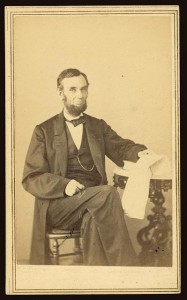Presidential Prophecy?
From The New-York Times December 13, 1862:
NEWS FROM WASHINGTON.; What the President Says About Affairs at Fredericksburgh. …
WASHINGTON, Friday, Dec. 12.
WHAT THE PRESIDENT SAYS.
Upon receiving the news from Fredericksburgh last evening, the President is said to have remarked, ” The rebellion is now virtually at an end,” and to have added a prophesy that Richmond would be in possession of the Union troops before the first of January.
ANXIETY FOR THE NEWS.
The city to-day has been in a state of feverish anxiety for news from Fredericksburgh. This feeling increased towards night, in consequence of the [???] of the Government, and rumors put [???] circulation by secesh sympathizers, of successes by the rebels, and evening closed without bringing relief to the minds of the people generally, as nothing positive transpired till a very late hour. Citizens of New-York City go to bed, to-night, generally as well informed of to-day’s operations as those of Washington, and the dispatches sent to the TIMES to-night will give them, to-morrow morning, a clearer knowledge of the situation than the public here can be expected to possess. As we close there is general evidence that all is well with our army, and every indication of stirring and decisive events to-morrow. …
That kind of extreme over-confidence doesn’t sound too much like Abe Lincoln to me; he seems much more realistic in this message to Fernando Wood from 150 years ago today (at Project Gutenberg):
TO FERNANDO WOOD.
EXECUTIVE MANSION, WASHINGTON DECEMBER 12, 1862.
HON. FERNANDO WOOD.
MY DEAR SIR:—Your letter of the 8th, with the accompanying note of same date, was received yesterday. The most important paragraph in the letter, as I consider, is in these words:
“On the 25th of November last I was advised by an authority which I deemed likely to be well informed, as well as reliable and truthful, that the Southern States would send representatives to the next Congress, provided that a full and general amnesty should permit them to do so. No guarantee or terms were asked for other than the amnesty referred to.”
I strongly suspect your information will prove to be groundless; nevertheless, I thank you for communicating it to me. Understanding the phrase in the paragraph just quoted—”the Southern States would send representatives to the next Congress”—to be substantially the same as that “the people of the Southern States would cease resistance, and would reinaugurate, submit to, and maintain the national authority within the limits of such States, under the Constitution of the United States,” I say that in such case the war would cease on the part of the United States; and that if within a reasonable time “a full and general amnesty” were necessary to such end, it would not be withheld.
I do not think it would be proper now to communicate this, formally or informally, to the people of the Southern States. My belief is that they already know it; and when they choose, if ever, they can communicate with me unequivocally. Nor do I think it proper now to suspend military operations to try any experiment of negotiation.
I should nevertheless receive with great pleasure the exact information you now have, and also such other as you may in any way obtain. Such information might be more valuable before the 1st of January than afterwards.
While there is nothing in this letter which I shall dread to see in history, it is, perhaps, better for the present that its existence should not become public. I therefore have to request that you will regard it as confidential.
Your obedient servant,
A. LINCOLN.
Back to Fredericksburg
As Union troops crossed the Rappahannock 150 years ago today they pillaged the city of Fredericksburg. According to Shelby Foote [1] as the federals were having their fun in the old colonial town, they began to wonder why the Confederates were not putting up any resistance. Some thought it was because they were out of artillery shells or General Lee was trying to influence Europeon opinion by contrasting the Yankee barbarity with Southern restraint. “Still another, a veteran private, had a different idea. ‘Shit’, he said. ‘They want us to get in. Getting out won’t be so smart or easy. You’ll see.'”
- [1]The Civil War: A Narrative, Volume II Fredericksburg to Meridian (New York: Vintage Books, 1986), 30.↩


![Night. The sacking of Fredericksburg-- & biovace[sic]of Union troops (by Arthur Lumley, 1862 December 12; LOC: LC-DIG-ppmsca-20787) Night. The sacking of Fredericksburg-- & biovace[sic]of Union troops (by Arthur Lumley, 1862 December 12; LOC: LC-DIG-ppmsca-20787)](https://www.bluegrayreview.com/wp-content/uploads/2012/12/20787r.jpg)